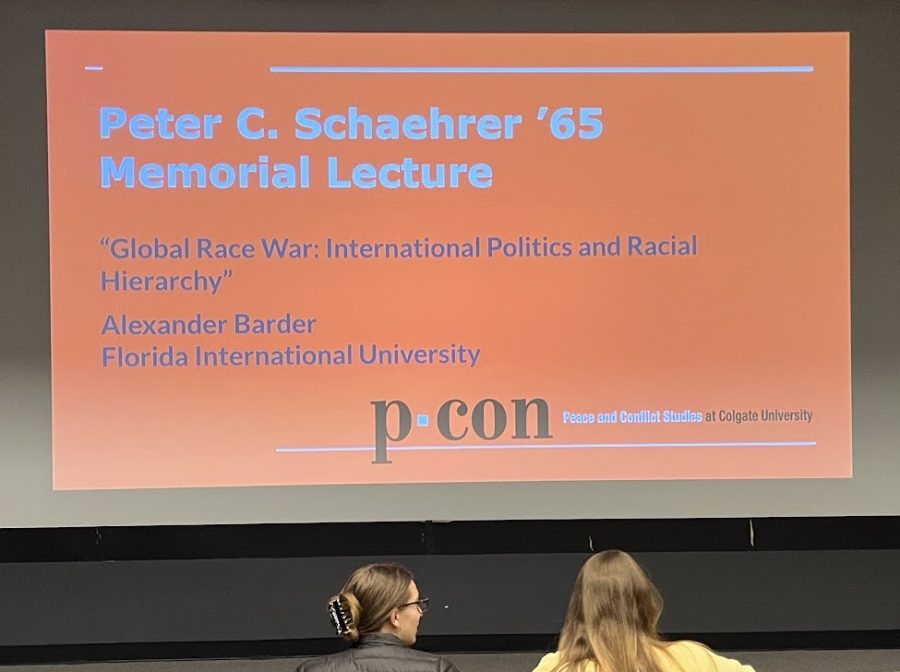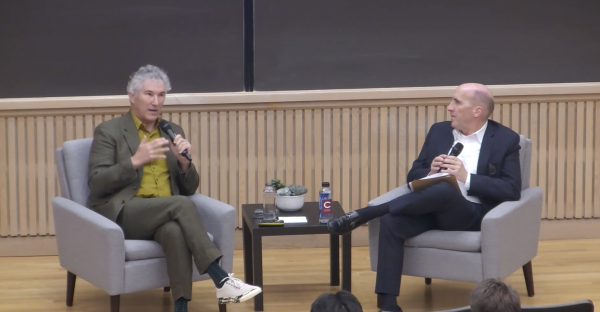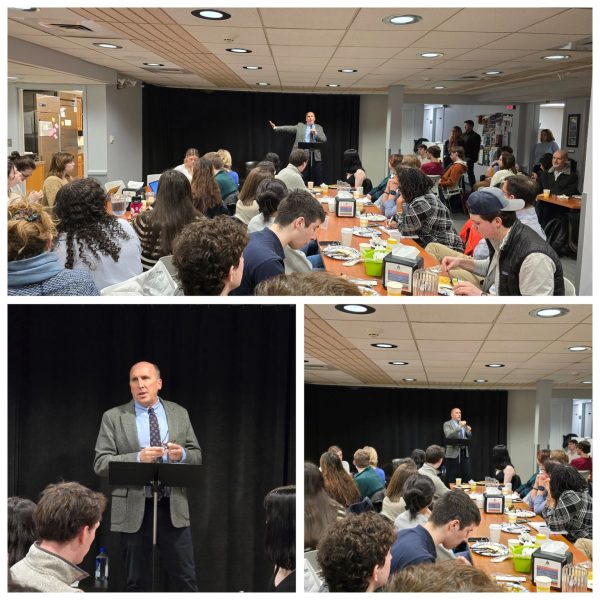Professor Alexander Barder Delivers Peter C. Schaehrer Memorial Lecture
On Sep. 29, Professor Alexander Barder, Associate Professor and Graduate Program Director for International Relations at Florida International University, gave the 13th Peter C. Schaehrer lecture series talk. Started by members of Colgate’s class of 1965, the series seeks to encourage students to question the world around them. Through the lecture series, the peace and conflict studies (PCON) department hopes Colgate students continue to learn in Schaehrer’s legacy and understand the impact their ideas can have.
John McClain ‘68, who studied with Schaehrer during his time at Colgate, spoke on the impact of the conversations they shared in college.
“Not only was Peter taking me seriously, he was, without ever saying this, challenging me to take myself seriously,” McClain said.
At the beginning of his lecture, Barder also praised Schaehrer’s legacy.
“Peter was evidently a remarkable individual and an advocate of human and civil rights and the idea of honoring his legacy with a lecture series to advance critical thought is even more imperative today when such pursuits are increasingly called into question,” Barder said.
Barder’s new book, Global Race War: International Politics and Racial Hierarchy, explores the human rights issues the world faces today by examining the system they were developed in. Today’s current study of international politics was formulated in the late 20th century, after the globe suffered two world wars and an economic depression. The global system that then developed was underpinned by the fear these events caused.
“My work is then focused on the conceptual and historical legacies of empire and race that came to constitute the modern global order,” Barder explained.
Barder dubbed this imperialist system rooted in race as the “social imaginary” and illustrated his lecture with a variety of examples present in today’s world. This system can be seen in many everyday objects. Barbed wire, originally developed to hold cattle in urban landscapes, was later used as part of Cuba’s reconcentracion camps towards the end of the 19th century. Intelligence tools developed for conflict in Iran and Afghanistan are now used in U.S. police departments, such as license plate scanners.
First-year Cody Johnson, who attended the lecture, learned new information from Barder that challenged her view of the world.
“In the lecture, Barder talked about inventions, such as barbed wire, whose intended purpose was adapted to repress colonized people. He then went on to explain how those inventions have been reframed and placed back into urban society. I was very intrigued by this and plan on exploring other everyday materials and objects that have imperialist intentions,” Johnson said.
As well as everyday objects, Barder used historical events to encourage students to question the world system. A prominent example is the Haitian Revolution: when slaves in the French colony of Saint Domingue revolted, they surprised white French leaders as they thought they were the only ones with the concept of liberty. Barder claims the Haitian Revolution was the first time racial genocide was seen as a solution to resistance movements as the French navy planned on exterminating Black Haitians to resolve the conflict.
“The book explores various historical moments of when the global social imagery was in the process of solidifying itself, how it experienced moments of crisis and resulted in […] extraordinary violence,” Barder explained.
Barder’s book spans from the revolution in Haiti to the present. He finished his lecture by discussing contemporary examples of racial strife in the global system, including during the final question and answer segment of the talk. Barder referenced events in Russia to explain the impact of the racial social imaginary currently. During the Cold War, the conflict between the U.S. and Russia was viewed as an internalized dispute between two similar countries. Later, when problems with China arose, the conflict with the U.S. was a global one since China was seen as “other.” In today’s current climate, according to Barder, Russia has returned to being perceived as Asiatic, with different customs and behaviors in war than Western countries.
“We see this creeping aim of racialized language with regards to Russia that Russia is now becoming Asiatic again, with all these sort of racialized connotations to it,” Barder said.
Barder’s lecture opened the semester for the PCON students, who have many opportunities outside of class to engage in their studies. Students like Johnson also noted their interest in seeing more events like this lecture.
“I am taking PCON225 right now [Theories of Peace and Conflict: War, State, and Society] and plan on [concentrating] in PCON, so this event was a great way to delve deeper into the theories we are learning in class,” Johnson said.

Emma McCartan is a junior from Guilford, Conn., concentrating in international relations and Middle Eastern and Islamic studies. She has previously served...







